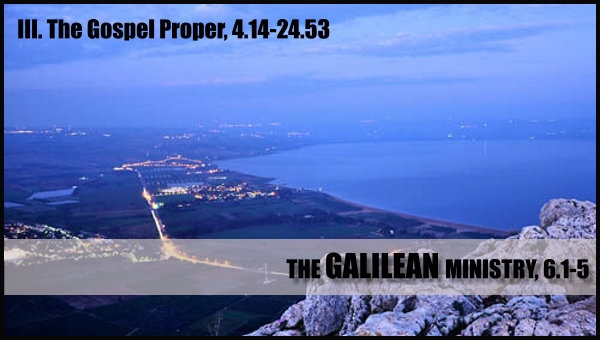By Tyson Thorne

The Galilean Ministry at Various Cities (4.14-9.50), 6.1-5
When teaching in a synagogue on the Sabbath it was customary for the teacher to sit. This seems odd to modern Jesus-followers as we are used to a preacher standing -- usually behind a pulpit -- but in the first century teaching was more relaxed. Therefore, after teaching in the synagogue we often see Jesus going for a walk and mingling with the people who needed him most. The Sabbath mentioned in the first verse of chapter six is one such day. Jesus and the disciples are walking through a grain field and began snacking on some of the stalks.
Evidently they were within view of others when this occurred, for some Pharisees witnessed the event and went to have words with these disobedient Jews. A little background to help make sense of their objection may be useful here. Jesus and the disciples were not stealing, it is permitted under the Law to pick and eat food from your neighbor’s field so long as you didn’t take anything with you. You had to eat it there, and grain is specifically mentioned in Deuteronomy 23.25. The objection raised by the Pharisees was that the preparation of food on a Sabbath (Exodus 20.8-11) was strictly forbidden; rubbing the heads of the stalks as they did to obtain the grain they ate constituted food preparation. They witnessed Jesus disobeying a direct command of the Law, or so they thought.
Jesus makes an interesting case from a story told in 1 Samuel 21. David had been anointed King, but Saul was still on the throne and had begun his treacherous plot to assassinate David. The fresh king of Israel and his loyal men had to leave Jerusalem urgently and there was no time to pack provisions. David set out with his men to the outpost of Nob where he met up with a priest named Ahimelech. The priest was surprised to be visited by David, and even more surprised when David appeared vulnerable and alone, without his usual entourage of soldiers. Knowing Ahimelech was his only chance at food and provisions, and knowing Ahimelech would not want to involve himself in a political plot, David fed him a story (and not a very good one at that).
In essence, David told the priest he was on a top secret mission, details of which he was not at liberty to disclose, but was sent by Saul to obtain five loaves of bread and any weapons the sanctuary may have. The only bread on hand was the bread set aside for the priests to eat, bread that was placed in the holy room of the temple and which is replaced with fresh bread once a week. It being the Sabbath, the bread had just been exchanged, leaving 12 loaves of week old bread for the priests.
Normally this bread had to be eaten in the temple as it was considered holy. While Ahimelech was willing to let the bread leave the temple as ordered by the king, he wanted to assure that the bread was eaten in the manner prescribed for the priests. This involved abstaining from sex for a period of time before serving in their priestly capacity. (This may be part of the reason the various priestly orders in Jesus’ day rotated their service in the Temple.) David assured the man that this was so, and that even the armor his men wore was considered holy, so all should be right according to the law. Well, at least as right as it could be given the circumstances.
The point Jesus is making is that even though David and his men did what would normally be considered unlawful, God (the Law-giver) permitted it. Jesus drew a parallel for the Pharisees. The priests prepared fresh bread every Sabbath and placed it in the temple. The last week’s bread (also prepared on a Sabbath) was eaten by the priests in the Temple and, presumably, in the presence of God. Similarly, the disciples (acting as a new priesthood) prepared the grain they ate on a Sabbath and ate in the presence of God (Jesus). This is what Jesus means when he tells the Pharisees “The Son of Man is lord of the Sabbath”.
|
|